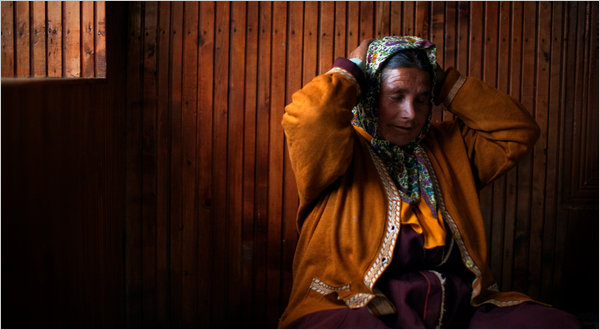 NYT story on how polyandry (a wife shared by two or more men) dies out rather rapidly in remote, northern India, once the connectivity of globalization ends its isolation--and presumably the restrictions that led to the practice.
NYT story on how polyandry (a wife shared by two or more men) dies out rather rapidly in remote, northern India, once the connectivity of globalization ends its isolation--and presumably the restrictions that led to the practice.
Details:
Now 70 and a widow who is still married— one of her husbands is dead — Ms. Devi is a ghost of another time, one of a shrinking handful of people who still live in families here that follow the ancient practice of polyandry. In the remote villages of this Himalayan valley, polyandry, the practice of multiple men marrying one wife, was for centuries a practical solution to a set of geographic, economic and meteorological problems.
People here survived off small farms hewed from the mountainsides at an altitude of 11,000 feet, and dividing property among several sons would leave each with too little land to feed a family. A harsh mountain winter ends the short planting season abruptly. The margin between starvation and survival is slender.
“We used to work and eat,” Ms. Devi said, her face etched by decades of blistering winters, her fingers thick from summers of tilling the soil. “There was no time for anything else. When three brothers share one lady, they all come back to one house. They share everything.”
Polyandry has been practiced here for centuries, but in a single generation it has all but vanished. That is a remarkably swift development in a country where social change, despite rapid economic growth, leaping technological advances and the relentless march of globalization, happens with aching slowness, if at all.
After centuries of static isolation, so much has changed here in the Lahaul Valley in the past half-century — first roads and cars, then telephones and satellite television dishes, and now cellphones and broadband Internet connections — that a complete social revolution has taken place. Not one of Ms. Devi’s five children lives in a polyandrous family.
“Times have changed,” Ms. Devi said. “Now nobody marries like this.”
You see this all the time with connectivity. Think of the Mormons with polygamy in isolated Utah, until they want to join the United States for real and they decide to ditch the practice, with the usual hardcores holding on. Same will happen with female circumcision in places like Kurdistan as it opens up to globalization.
Time and again, "sacred traditions" are ditched because they either no longer are necessary or because they hold you back in your interactions with the larger world.
I wave such cultural distinctiveness a fond farewell.